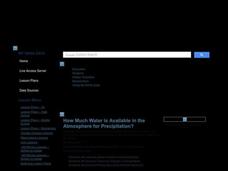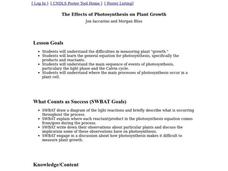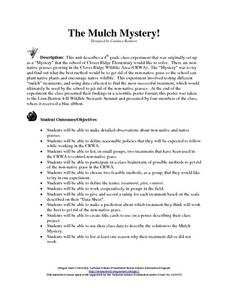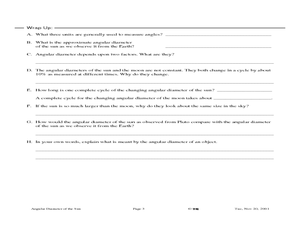It's About Time
Polymers
All plastics contain polymers, but not all polymers are plastic. Young chemists make their own polymer and compare the properties to those of other states of matter. After a reading passage, pupils answer analysis questions about natural...
Curated OER
Exploring Magnets and Magnetism
Here is a very good lesson on magnets, magnetism, and magnitic fields that is chock full of great activities for you to implement with your young scientists. Learners discover the properties of magnets, look at the forces of attraction...
Curated OER
Strawkets and Weight
Students investigate the effect that weight has on rocket flight. They construct a variety of straw-launched rockets that have different weights, observe what happens when the weight of a rocket is altered by reducing its physical size...
Curated OER
The Parachute
Young scholars discuss parachutes and write a procedure to determine the effect of different size parachutes and different masses on the time it takes the masses to fall. They record all their data from their experiment then write three...
Curated OER
Recognizing Litter
When does trash become litter? Use this litter awareness lesson to help them understand the importance of trash disposal. Get learners engaged by reading Nancy Loewen's Lady Lulu Liked to Litter (not included). After discussing what...
Curated OER
On The Light Side
Kindergartners identify different sources of light in a science activity. They view pictures of a flashlight, a match, and a lamp, among others, and color the part of the picture that creates light. A science activity prompts them to...
Center for Learning in Action
Properties of Balls
Enhance your states of matter lessons with a hands-on science investigation that compares six different balls' color, texture, size, weight, ability to bounce, and buoyancy.
Center for Learning in Action
Gases
Explore the properties of gases through one activity and two investigations in which super scientists observe the changes gas makes when encountering different conditions.
Laboratory for Atmospheric and Space Physics
Planetary Distances on the Playground
There's no need to stay inside; get out of the classroom and create a scaled map of the solar system on your playground field! In collaborative groups, scholars identify the distance between the sun and other planets, place planet...
Curated OER
It's Just Dirt
Students discover how seed germination varies according to the soil type. In this soil science instructional activity, students discuss what plants need in order to grow and investigate various types of soil. Students use their senses to...
Curated OER
Sculptors of the Earth
Students observe evidence of erosion and various rock formations that have formed as a result of erosion and weathering. Their task is to explain how the forces of weathering and erosion contributed to sculpturing these rocks into arches...
Curated OER
How Much Water is Available in the Atmosphere for Precipitation?
Students explore the relationship between the amount of water in the atmosphere available for precipitation and the actual precipitation observed by satellite. They examine seasonal changes in precipitation. They practice using Internet...
Curated OER
The Effects of Photosynthesis on Plant Growth
Students are able to draw a diagram of the light reactions and briefly describe what is occurring throughout the process. They are able to explain where each reactant/product in the photosynthesis equation comes from/goes during the...
Curated OER
Fossils!
Students explore what fossils are, how they are formed, what different types there are and why they are significant to both our present and past geology history. They participate in a hands on fossil observation of their choice and...
Curated OER
The Mulch Mystery!
Fourth graders make a detailed observations about non-native and native grasses. They define reasonable policies that they expect to follow while working in the CRWA. Students list, in small groups, two treatments that have been used in...
Curated OER
Angular Diameter of the Sun
Starting with a paragraph of information presenting the different ways we can observe planetary objects, pupils work through these instructions to see how they can observe and measure angles. Your class will discover how these...

















